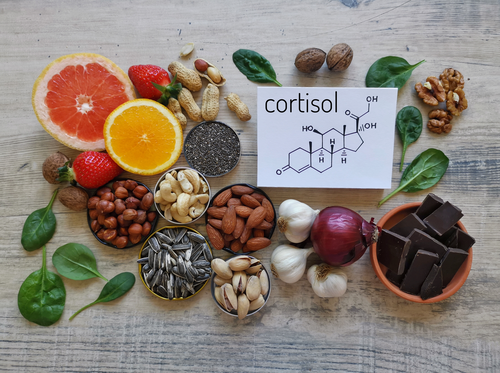Stress is a part of modern life but its impact goes beyond just mental stress – it can also affect your physical health and weight loss. Diet and exercise are key to losing weight, but stress can undo all that by changing your metabolism, increasing cravings for unhealthy foods, and disrupting sleep. Strategies to decrease stress, such as exercise, meditation, mindful eating, and improving social support, are essential to manage stress and support weight loss.
In this blog, we’ll explore how stress affects weight loss, the science behind these effects, and practical strategies to manage stress effectively, including how our Mediterranean Paleo meal plans can support your efforts by providing balanced, nutrient-rich meals designed to help you stay on track even during stressful times.
The Science Behind Stress and Weight Gain
Stress is not just mental and emotional but also has profound physiological effects that can cause weight gain and hinder weight loss.
The Fight-or-Flight Response
Stress triggers the fight-or-flight response, an evolutionary mechanism to protect us from danger. When we are stressed the body releases adrenaline and cortisol which prepares us for immediate physical action. This was vital for early humans facing predators but today it’s triggered by non-physical stressors like work pressure or financial concerns. In these cases, the body is in a state of high alert without using the energy it has prepared to use thus conserving calories and storing fat.
Stress and Hormonal Imbalance
One of the stress hormones released during stress is cortisol, often called the “stress hormone”. Elevated cortisol levels make the body hold onto fat, especially around the belly. Cortisol not only encourages fat storage but also increases appetite and makes us crave high-calorie and high-sugar foods. Chronic stress also reduces the body’s sensitivity to insulin, which regulates blood sugar. This insulin resistance makes the body retain more glucose in the bloodstream, thus contributing to weight gain and making it harder to lose fat.
Sleep Deprivation and Weight Gain
Stress affects sleep which has a compounding effect on weight gain. Lack of quality sleep alters the levels of two key hormones: ghrelin and leptin. Ghrelin the hormone that stimulates appetite increases with sleep deprivation while leptin the hormone that signals satiety decreases. This imbalance makes us hungrier and crave food thus making it harder to control food intake. Poor sleep also slows down metabolism and makes the body look for quick sources of energy like sugary snacks thus hindering weight loss.
Emotional Eating
When we are stressed many of us turn to food as a coping mechanism, this is called emotional eating. Stress-related emotional eating leads to the consumption of comfort foods – high in sugar, fat, and calories. These foods give us temporary relief but don’t address the underlying stress. Over time emotional eating can contribute to weight gain and make long-term weight management harder. Opting for relatively healthier comfort foods, like air-popped popcorn or almonds, can provide similar mood-boosting effects as traditional comfort items, while also potentially avoiding negative health impacts like increased belly fat.
How Stress Affects Weight Loss
Understanding how stress affects weight loss is crucial for anyone on a weight loss journey. Stress can trigger many physiological responses that make weight loss harder. Here we’ll look at the ways stress affects weight loss.
Hormonal Changes
Stress releases cortisol, a hormone that plays a big role in fat storage. High cortisol levels can lead to belly fat, make it harder to lose weight and cause us to gain weight. Cortisol also increases hunger and makes us crave sugary and fatty foods. This combo can sabotage our weight loss.
Blood Sugar and Insulin Sensitivity
Stress can affect insulin sensitivity and blood sugar levels. When we are stressed our body may struggle to regulate blood sugar and we may experience spikes and crashes. This fluctuation can make us crave carbohydrates and make it hard to stick to a healthy eating plan.
Sleep Disturbances
Stress disrupts sleep patterns and we get insomnia or restless nights. Poor sleep quality makes us choose unhealthy foods as lack of sleep makes us crave high-calorie foods. Sleep deprivation also affects our metabolism making weight loss harder.
Eating Habits
During stressful times we tend to go for convenience foods rather than nutritious ones. Emotional eating becomes a coping mechanism and we prefer high-fat and high-sugar foods. This habit can sabotage our weight loss.
Inconsistent Eating Patterns
Stress can make us skip meals and have irregular eating patterns. Skipping meals often leads to overeating later as hunger builds up. This cycle makes it hard to maintain consistent calorie intake which is important for effective weight management.
Factors that Contribute to Weight Gain
Understanding the factors that contribute to weight gain is crucial for anyone who wants to manage their weight. Stress is one of the factors and it triggers many physiological and behavioral changes. Here we’ll look at the factors that can contribute to weight gain, especially during stressful times.
Increased Appetite and Cravings
Stress releases cortisol a hormone that can increase appetite. When cortisol levels rise many of us experience intense cravings for unhealthy foods especially those high in sugar and fat. This leads to overeating and poor food choices making it hard to maintain a healthy weight. Recognizing these cravings as stress responses can help us make more mindful food choices.
Lack of Sleep
Poor sleep quality and lack of sleep can worsen weight gain. Stress often leads to sleep disturbances like insomnia or restless nights. When we don’t get enough sleep our body craves quick energy foods which are high in calories and low in nutrients. This cycle can create unhealthy eating and weight gain habits. Sleeping well is key to a healthy lifestyle.
Reduced Physical Activity
Stress can also reduce physical activity. When we are overwhelmed we find it hard to stick to our exercise routine. This reduction in physical activity can lead to weight gain as we burn fewer calories throughout the day. Adding small physical activity to our daily routine can help us combat stress and weight management. Finding enjoyable activities makes it easier to stay active even during tough times.
How to Manage Stress for Weight Loss
Managing stress is key to effective weight management. Here are some tips to help you reduce stress and healthier habits.
Stress Reduction Techniques
Practicing relaxation techniques can lower stress levels. Techniques like diaphragmatic breathing, progressive muscle relaxation, and guided visualization can help. These methods calm the mind and reduce cortisol levels which in turn can prevent stress-related weight gain.
Mindfulness and Meditation
Adding mindfulness to your daily routine can be helpful. Mindfulness-based stress management helps you become more aware of your thoughts and feelings. This awareness can lead to a better response to stress and cravings for unhealthy foods. Meditation can also give you a mental break and help you reset and refocus.
Healthy Habits
Healthy habits are key to managing stress. A balanced diet of whole foods, regular physical activity, and enough sleep are the components. Eating well supports our body’s needs and can stabilize our mood while exercise releases endorphins that boost our overall well-being.
Self Compassion and Social Support
Having a support network is important. Being surrounded by people who support our healthy choices can make a big difference. Practicing self-compassion allows us to be kinder to ourselves during tough times and reduces feelings of guilt that can trigger unhealthy eating habits.
Eating Patterns
Eating at regular intervals can help regulate hunger. Skipping meals can lead to intense cravings and overeating later. Try to eat balanced meals at the same time to keep your energy levels stable and hunger in check.
Physical Activity
Regular physical activity is good stress management. Exercise not only burns calories but is also a natural stress reliever. Whether it’s a brisk walk, yoga, or a gym workout, find an activity you enjoy and it will be easier to stay active.
Start Living a Healthier Life With Upstate Weight Loss Solutions!
Ready to take control of your weight loss journey and manage stress effectively? At Upstate Weight Loss Solutions, our expert team is here to guide you every step of the way. We provide personalized support and strategies to help you achieve your goals while maintaining a balanced, healthy lifestyle.
Contact us at (864) 514-6463 to get started today!





